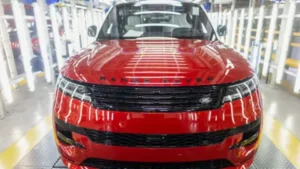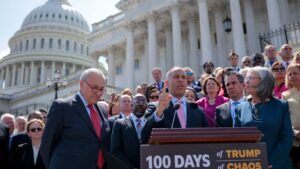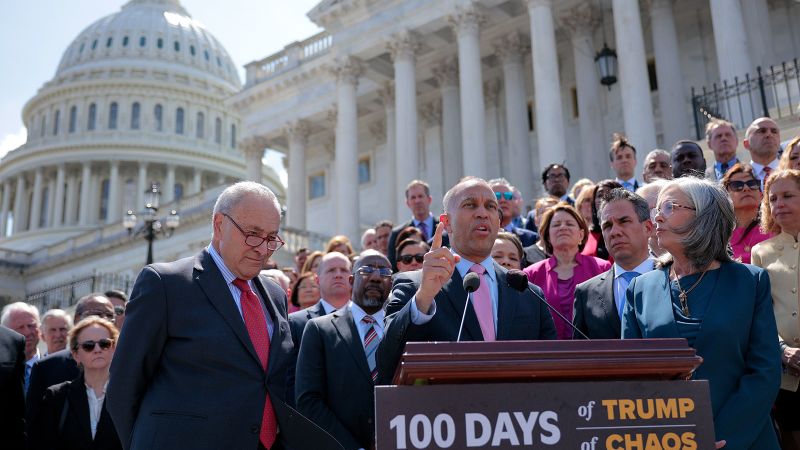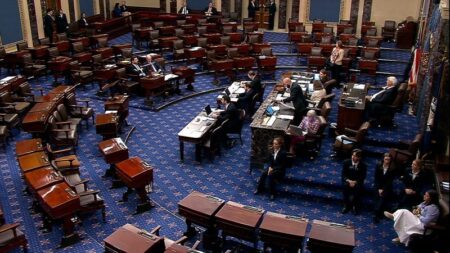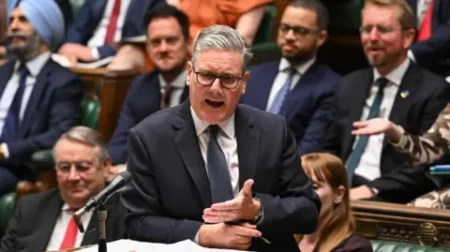As America approaches the midterm elections next year, a recent CNN poll reveals a notable disparity in voter enthusiasm between Democrats and Republicans. The Democratic base appears significantly more energized, with 72% of registered Democrats and those aligned with the party expressing strong motivation to participate in the upcoming congressional elections. This level of engagement exceeds the motivation levels recorded for Democrats during the critical weeks leading up to the 2024 presidential election by 10 points, and stands starkly higher—by 22 points—compared to their Republican counterparts.
Despite this enthusiasm, the favorable perception of the Democratic Party has reached an all-time low, with only 28% of Americans viewing it positively. This marks the lowest approval rating for the Democrats since CNN began tracking such data in 1992. In contrast, perceptions of the Republican Party are also struggling, with just 33% viewing it favorably—equivalent to approval ratings recorded in the aftermath of the January 6 Capitol insurrection. This presents a curious situation: while Democrats appear poised to capitalize on their voter enthusiasm, they grapple with significant challenges related to public perception, especially among younger voters.
Insight from the poll suggests a critical divide within the party itself. Among voters under the age of 45 who identify with the Democratic Party, only 52% support the reelection of incumbent Democratic members of Congress, whereas a significant 48% believe they should not remain in office. Conversely, older Democrats show a much more favorable stance, with 76% indicating that they believe their elected officials deserve an additional term. This intra-party perception gap raises urgent questions about the future leadership and direction of the Democratic Party, especially as the midterm elections loom.
This skepticism is echoed in a broader context, where nearly 60% of Americans opine that most current members of Congress from the Democratic Party do not deserve another term. Moreover, Democrats are reportedly 7 points less likely than Republicans to believe their own party members warrant reelection—76% of Republican-aligned individuals hold a favorable view of their party, while only 58% of Democrats feel the same about theirs. Such sentiments have led to historic lows in favorability ratings for the Democratic Party.
Interestingly, among the electorate, a substantial number of Americans feel that complete Republican control over the White House and Congress would be detrimental to the nation, with 57% agreeing on this notion. This sentiment persists despite the ongoing negative perceptions surrounding not only the Trump presidency but the Republican Party as a whole, with many Americans believing that a significant portion of GOP members in Congress should not be reelected.
Amidst this negative landscape, the Democratic Party may have an advantage among political independents, with approximately two-thirds of them perceiving full GOP governance as unfavorable. Interestingly, there is a slightly higher percentage of independents who believe that most Democratic members of Congress deserve reelection (38%) compared to their Republican counterparts (33%). This sentiment grows even stronger amongst independent voters who emotionally connect with the upcoming elections, revealing that more independents leaning toward the Democratic Party are motivated to engage politically.
Turning attention to the landscape shaped by former President Donald Trump, although he will not be on the ballot in the upcoming elections, his influence remains pronounced. About 30% of Americans identify as Republicans, but a significant 37% declare support for Trump specifically. Notably, his most committed followers demonstrate a heightened motivation to vote compared to other supporters. However, despite the strong loyalty of this subset, perceptions of Trump and his affiliates are not universally favorable.
In a twist related to third party sentiment, while public appetite for an alternative political party is broadly evident—with 63% of respondents supporting the idea—interest wanes significantly when associated with specific figures like Elon Musk, who has proposed establishing a new party amid tensions with Trump. Support for such an initiative drops to a mere 25%.
Survey data reveals a consistent pattern: though Americans generally favor a third-party system, specific associations can diminish enthusiasm. Historical trends reflect this notion, reminiscent of previous movements such as the Tea Party, where initial support waned once concrete proposals were presented.
Ultimately, as the 2024 midterm elections draw nearer, the patterns of motivation, public perception, and the potential for emerging political entities will shape the landscape ahead, paving the way for strategy adjustments from both the Democratic and Republican parties. The interplay of these dynamics will undoubtedly be crucial in determining the outcomes of the upcoming elections, influencing voter turnout, and the future trajectory of American political discourse.


